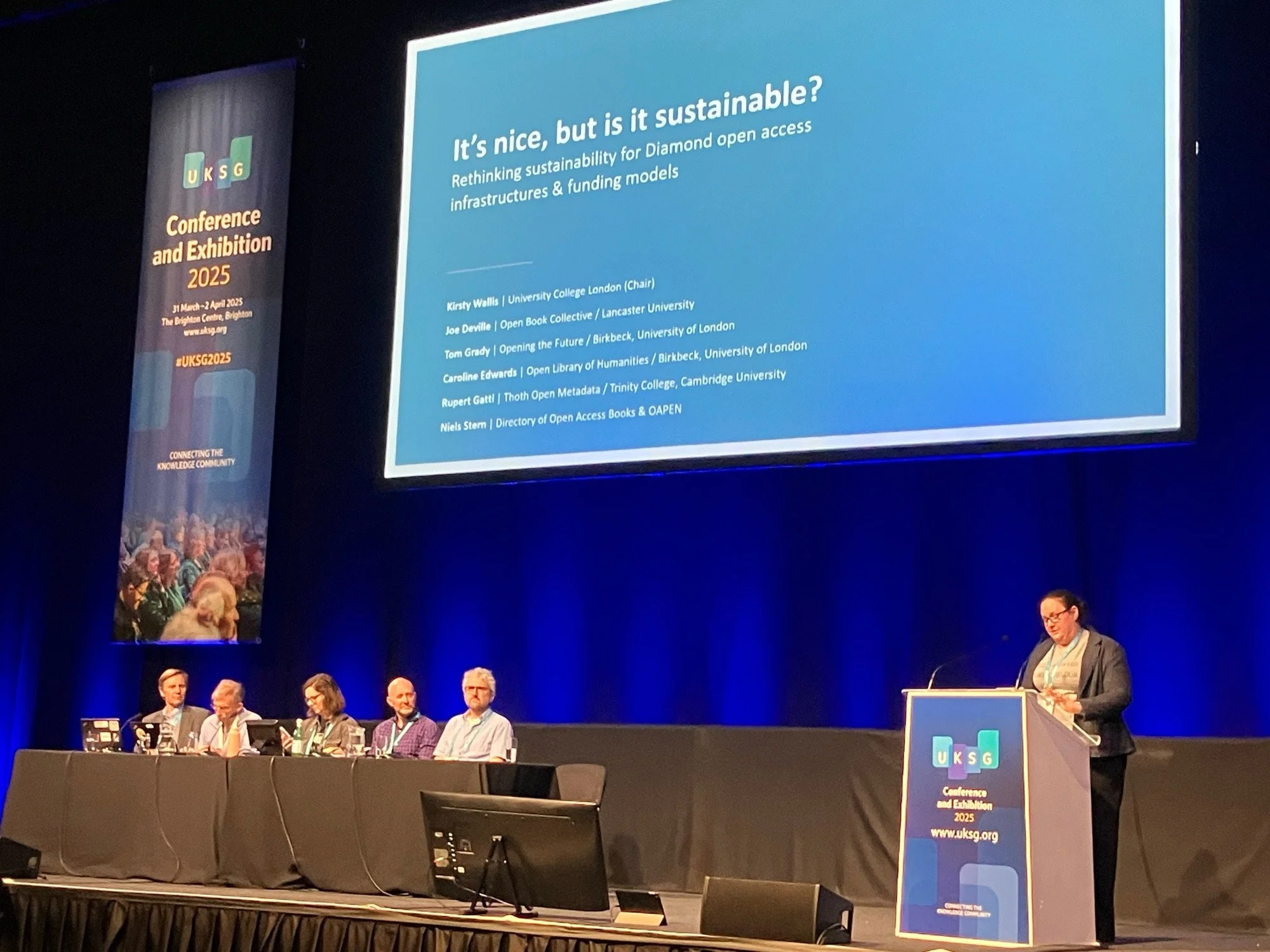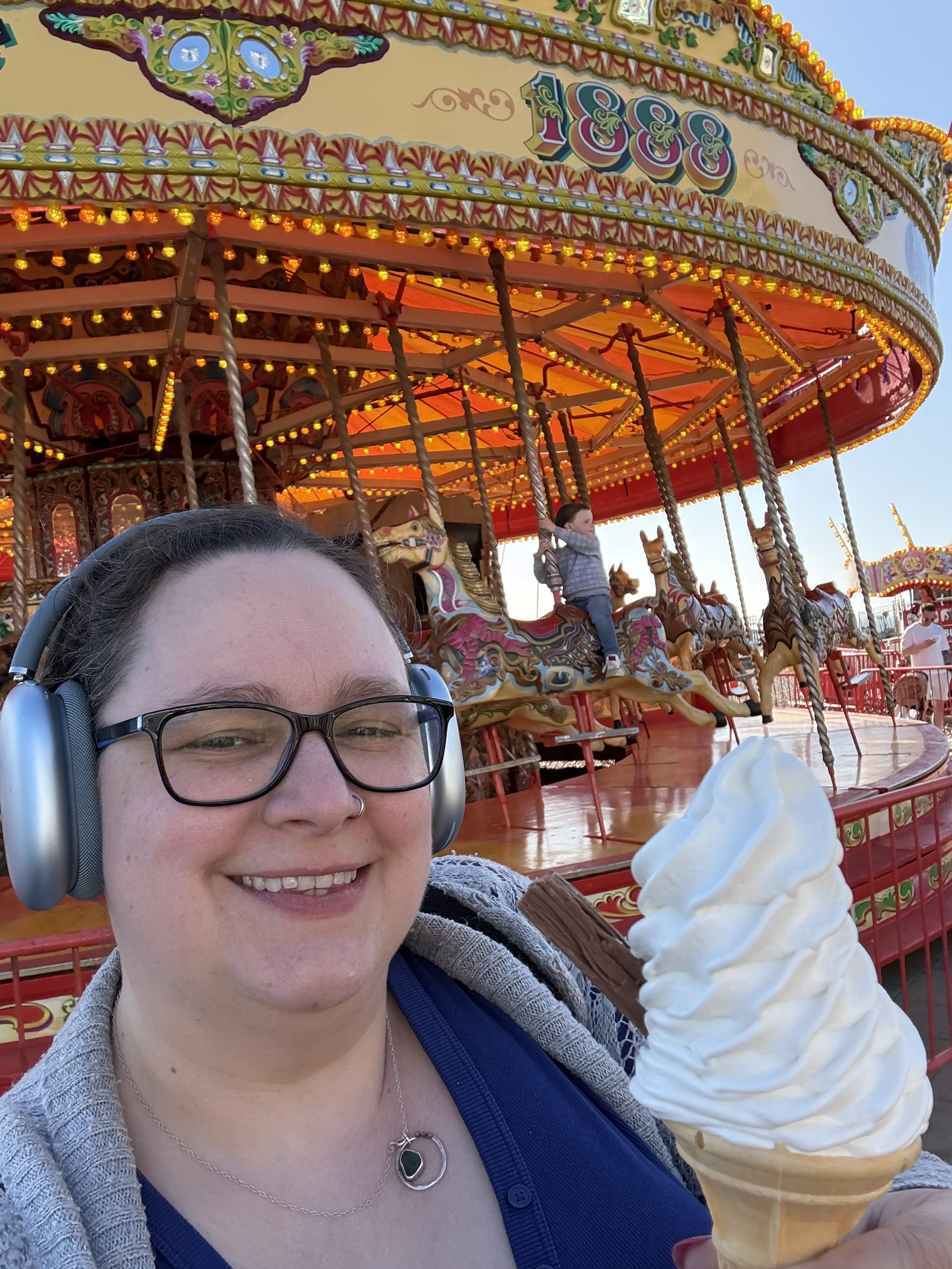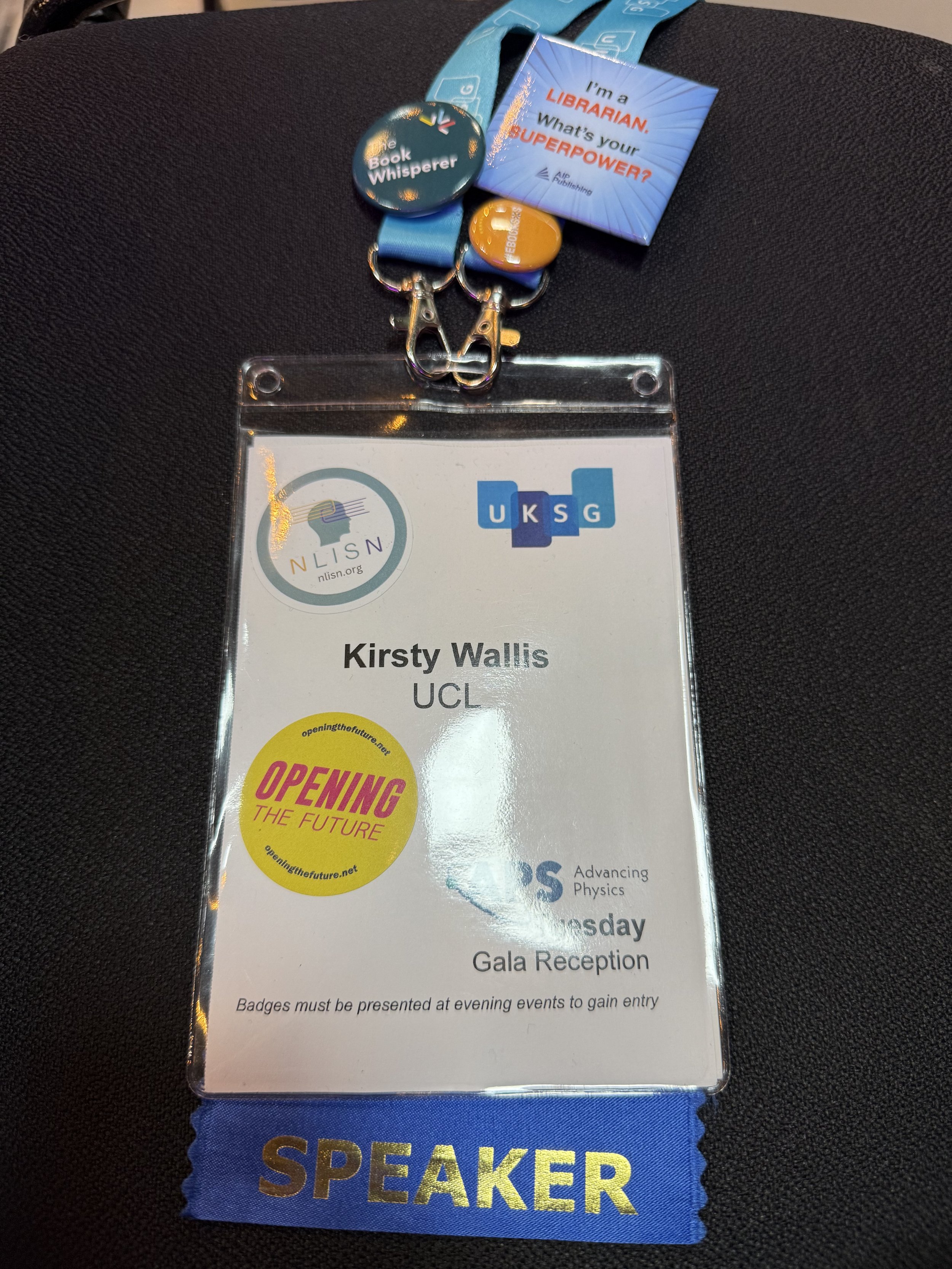UKSG 2025 - Oh we do like to be beside the seaside…!
In this post I wanted to take a moment to stop and reflect on the conference and some of the learning as well as the experience overall. I was pretty busy during the conference, with not one but two sessions I was involved in, so I’m probably not going to go into too much detail, I will leave that to others. There were also some amazing people who managed to live-post on BlueSky the whole time, a skill I have never managed! The hashtag #UKSG2025 has all the good stuff!
It’s been a couple of years since I have been to UKSG, my last time was in Glasgow so I was very excited that this year it was in sunny Brighton! Despite living within a stone’s throw of the beach for most of my life, it’s still hard to not get excited about sun, sea and sand right outside the conference venue!
I will say that the venue wasn’t my favourite for a conference, it was nice and big but it was nearly impossible to navigate and I spent a long time looking for people among the twists and turns of the building and between the booths. That was pretty annoying, but I did manage to catch most people I wanted to talk to, although at least two were on the way out!
I did love getting the time to catch up with some friends and colleagues, old and new, when I could find them! It was great to catch up with Thomas, Anne-Kathrine and Nel, as well as putting some faces to names such as Sarah Humphreys from Oxford and Anna Vernon from Jisc, and having a chat about the life of a consultant with Helen Anderson and Ken Chad. It was especially good to grab dinner with the indomitable Beth Montague-Helen who was also very busy during the conference and is always great to talk to. As she used to live in Brighton I got a nice magical mystery tour and an introduction to a lovely pub before heading to the Gala evening on Tuesday.
Citizen Science workshop
It’s always nice to be able to share our enthusiasm for citizen science with a new group of people. We have run a similar workshop at UKSG in the past, but this is the first time that we have had a full 2 hour workshop period, rather than just an hour in one of the breakout slots. Upon reflection, while the 2 hour slot was great, and it was lovely to have time to really get into everything we have all been doing and to get everyone that joined us thinking about the potential directions they could take a service in at their respective institutions, I do think that the session competing with not one but two breakouts did cost us audience members, a few left half way, and we didn’t get as many as I thought we would.
That said, having Nel with us this time was fantastic and we definitely had a fun time, and the group we did have were wonderfully engaged with the workshop!
Being able to share the different ways that we all chose to create support for citizen science at our vastly different institutions really reinforces the overarching goal of the workshop - to show that there is no one size fits all path and that everyone can forge their own way to success in supporting their own citizen science community.
After a brief ice breaker discussion about what citizen science means in different contexts we each told our own stories about the development of support for citizen science in our institutions, focusing on three elements which would then carry over into the rest of the workshop:
The Who - it is important to understand all of the factors in who you are dealing with in building support. This involves understanding the citizen science that is going on at your institution, but also their support needs and how your service may relate to their partners, internal and external.
The Why - this could constitute an elevator pitch for colleagues, or a justification for senior managers around why you should give time to supporting citizen scientists at your institution. You can relate this to published frameworks such as the UNESCO Recommendations on Open Science or the LERU 8 Pillars of Open Science and build it into a part of regular support for Open Science or Open Research at your institution.
The How - finally, the most difficult and yet the most simple, what’s the plan to get there? In the cases of our talks we shared the steps that we took to establish our services, and where we are going next. In the case of our workshop we asked the groups to try and think about where they would start, which led to some brilliant discussions and some fledgeling plans afoot which we look forward to seeing come to fruition!
It’s nice, but is it sustainable?
After the workshop, I had to run straight over to the auditorium (because why not do the first go through of a panel on a giant stage, that’s not intimidating at all!) and get set up for the panel.
I was honoured to be asked to step in as chair for this brilliant panel discussing a number of different Open projects and how they are trying different ways to become sustainable, not just financially, but the implications of infrastructure and environment.
It was also great to be able to support the launch of the new Open Journals Collective with this panel, full of amazing experts from Open Book Collective, the Opening the Future Project, Thoth Open Metadata, and the OAPEN Foundation.
As the chair of the panel I was asked to keep everyone to time with everyone aiming to speak for between 6 and 7 minutes. I was henceforth known as the lurker because the path we chose for timekeeping was for me to get up at the 6 minute mark, thereby signalling to each panel member to start to wrap it up. I would then introduce the next speaker and repeat. There were a number of people that seemed to find this process amusing, but it worked and we had lots of time for discussion as planned so we didn’t really change anything for the second go round, except giving people a little more time so my lurk timer went up to 7 minutes.
Both times we did manage to have a great discussion and the panel seemed to be as amused as I was by the lurker moniker I was gifted after the first one!
It wasn’t all conference…
I always like to try and take some time to look around a place when I get the opportunity to visit somewhere new. Perfect excuse for an ice cream!
Outside the sessions I was directly involved in, there were a few that resonated with me and I wanted to talk about. I went to all of the plenaries and while the AI and cybersecurity ones were interesting, there was a lack of actionable content for the audience, at least those of us that aren’t able to set the strategic direction or make high level decisions. Just my two cents on that though, we all know these issues are important by now, but I was hoping for an action or something to share onwards when I got home. Anyway…
NLISN Plenary
One plenary that I genuinely enjoyed was the session focusing on understanding and empowering neurodivergent staff. This session was extremely laid back and focused on sharing the different experiences of neurodivergent library workers, and the various issues that they face at work, in communication and in going back to the office. They were a lovely group of people who really wanted to improve things for colleagues and bring people together, hence the creation of the N-LISN network. They advocated for simple things from colleagues and managers such as compassion and kindness, and the importance of listening because the needs of ND colleagues can all be different.
They had a padlet on the go where people could ask questions and recommend resources which has since been updated so it’s worth a look.
The Library CEO
The session about library leadership ended up being different than I expected but it was good to hear the reflections of some current library leaders on their current roles and experiences. They took time to show the audience how their journeys had both been distinctly different and that they both even had different educational backgrounds. The panellists also spoke about the core skills used in their daily roles, which definitely lean towards the transferrable, things such as lots of communication, collaboration, digital leadership, persistence and resilience as well as the ability to take in, digest and make judgements on large volumes of information.
I think my main takeaway was from a part of the discussion about choices, whether you choose to act and step up in a moment or not. This may not apply specifically to a role as a manager or leader, but can help position you to be in the right place for the next opportunity as well as how it was important to show and maintain core values, be authentic, and be able to advocate for your position and choices.
Overall, it was a pretty interesting session that ended with a very interesting final point, that they hope the next generation of library leaders do things differently… challenge accepted!
Can Gold survive a shift to Green?
This post is already getting pretty long so I think there is only one more session I want to touch on, and that is the panel discussion of Gold and Green Open Access and what would happen if the swing to Gold in recent years was undone by the current financial and economic situation hitting institutions, as well as the Plan S and the subsequent growth of Rights Retention Policies.
In my own research, the growth and increasing costs of Gold have also come up, so I was really interested in this discussion. I was especially curious to see whether Transformative Agreement negotiations would also come up as a potential cause of a switch back to green, something which has come up in a number of my interviews, with some institutions preparing for the negotiations to collapse and a wholesale switch back to green-first in the near future.
Interestingly, this didn’t come up, at least in the iteration of the breakout I was at on the Tuesday afternoon. The discussion in this case focused more on the different attitudes and approaches to Green of Gold from the different speakers and actually whether the two can coexist, as well as what it would take for that to be sustainable. It is this sustainability that I found particularly interesting as well as the idea that gold, green and diamond could potentially give a range of options and a range of solutions for different journals and different institutions. Time will tell what actually happens on that front. In any case it was a great discussion with a brilliant diversity of speakers on the panel.
I did enjoy the new focus on stickers and badges as freebies
It was a great conference overall and I hope everyone else enjoyed it was much as I did.



